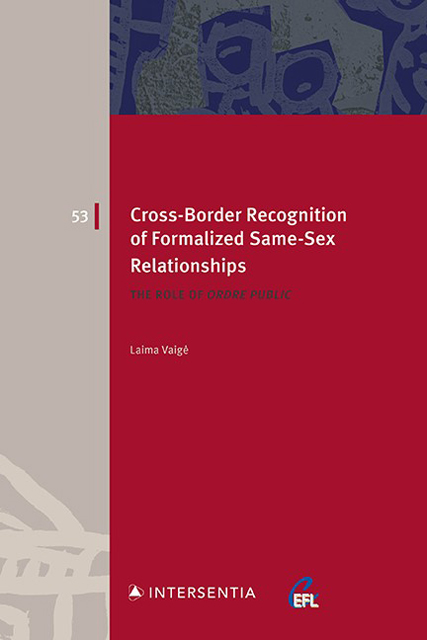Book contents
- Frontmatter
- Preface
- Contents
- List of Abbreviations
- Special Terminology
- List of Legislation and Other Instruments
- List of Cases
- Part I Setting the Stage
- Part II The Ordre Public in the Baltic States and Poland
- Part III The European and the EU Ordre Public
- Part IV Legal Effects of Formalized Same-Sex Relationships: National and Supranational Law
- Part V Law in Context
- Bibliography
- Index
- About the Author
- European Family Law Series
Chapter 10 - Granting Formalized Same-Sex Relationship Effects in Family Law and Beyond: National Law
Published online by Cambridge University Press: 20 April 2023
- Frontmatter
- Preface
- Contents
- List of Abbreviations
- Special Terminology
- List of Legislation and Other Instruments
- List of Cases
- Part I Setting the Stage
- Part II The Ordre Public in the Baltic States and Poland
- Part III The European and the EU Ordre Public
- Part IV Legal Effects of Formalized Same-Sex Relationships: National and Supranational Law
- Part V Law in Context
- Bibliography
- Index
- About the Author
- European Family Law Series
Summary
Introduction to the Chapter
In 2021, a study ordered by the European Parliament was published, in which Latvian, Lithuanian, and Polish experts claimed that same-sex marriages lawfully concluded abroad are not granted any other legal effects than immigration law in each of the respective countries. Meanwhile, in respect of Estonia, “same rights and obligations as heterosexual married couples” are expected to apply to same-sex marriages, according to the study. These short answers, mostly referring directly to constitutional provisions of the Baltic States and Poland rather than private international law, are far from revealing a complex area of law. In fact, these questions cannot be answered without consideration of the European ordre public, as discussed in previous chapters.
This chapter does not aim at providing a comprehensive report on every aspect of cross-border succession, post-divorce spousal maintenance, and property consequences of formalized family statuses. There are a few EU funded projects that provide overviews of the national rules on private international law and the issue of adaptation of law in such instances. Adaptation is needed when rights under foreign law are “unknown” in the legal system in which they are requested. The chapter does not go into details of the substantive law on property consequences of marriages, spousal maintenance and succession. The reader is kindly directed to the publication: “Family Property and Succession in EU Member States: National Reports on the Collected Data” (2019), which includes information in that regard.
The chapter examines the laws of analysed States in an alphabetical order: section 10.2 introduces the main actors dealing with the issues of legal effects in the analysed States, section 10.3 focuses on the cross-border legal effects in family law and beyond of formalized same-sex relationships in respect of Estonia, section 10.4 in Latvia, section 10.5 in Lithuania and section 10.6 in Poland. The chapter presents conclusions in section 10.7 Where relevant, the analysis of case-law and literature is included.
- Type
- Chapter
- Information
- Cross-Border Recognition of Formalized Same-Sex RelationshipsThe Role of <i>Ordre Public</i>, pp. 331 - 352Publisher: IntersentiaPrint publication year: 2022



